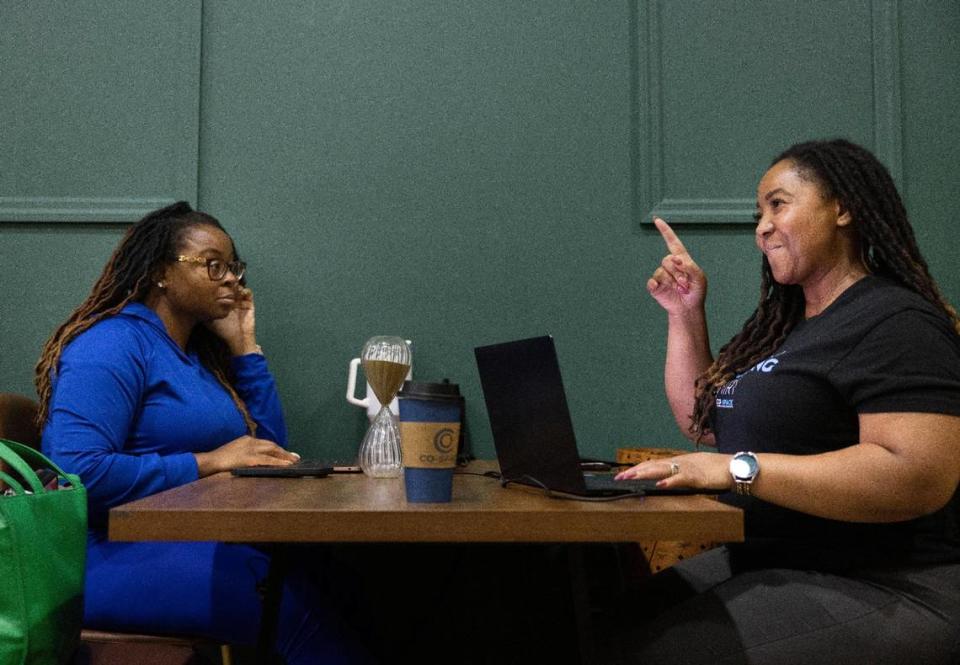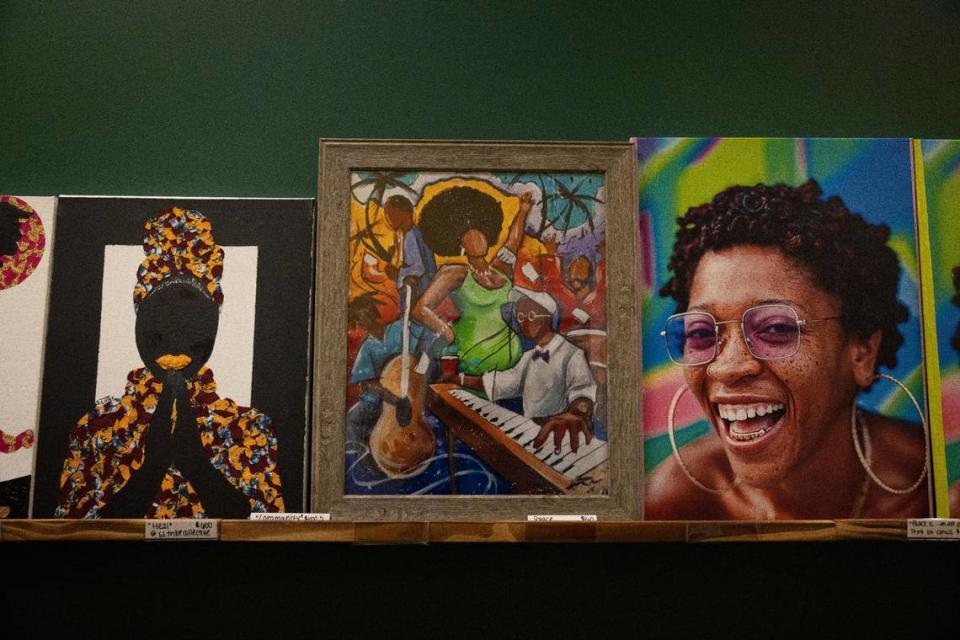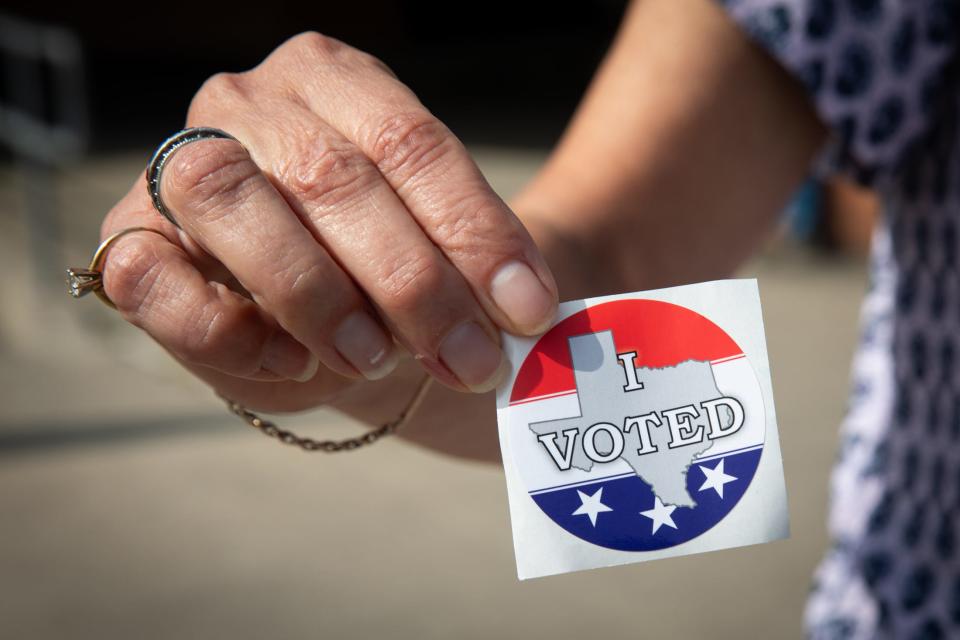At the Miami Gardens workspace Co-Space, the energy is more similar to the welcoming vibe of a close family member’s house than a stuffy office environment where people tap away at their laptops all day in silence. The lighting is warm, the walls are painted in calming neutral tones and smooth R&B music plays in the background.
That’s just what Co-Space founder Joy St. Clair wanted.
“I was one of those people looking for a place like this and couldn’t find it,” she said. “My mind was made up, and I decided that I was going to make the place. As I was building this place and this idea, people have been finding me.”
St. Clair, 37, grew up in Liberty City and later graduated from South Miami Senior High School’s magnet program. During the pandemic, she worked remotely as a project manager while pregnant. Having survived Non-Hodgkin lymphoma, she didn’t feel comfortable being in close contact with other workers. She remembered how her days seemed to move too fast as she worked from her laptop at home.
When she was ready to explore coworking spaces again, she found there wasn’t one that resonated with her as a Black professional, so she thought about building her ideal workspace.
St. Clair wanted her business in Miami Gardens because of its large Black community. Now a Miramar resident, she remembered visiting Miami Gardens before it was formally incorporated as a city and always appreciated seeing its successful Black businesses.

Working as a project manager sharpened St. Clair’s ability to bring an idea to fruition. After consulting with a real estate agent and assessing her budget, she found a location in a Miami Gardens strip mall full of Black businesses and knew she was onto something. Its location at 17560 NW 27th Ave. makes it a short drive away from different parts of Miami.
Co-Space had a soft opening last February and officially opened in May. Eight months later, the workspace has 18 regular members, two student members and one corporate membership serving 12 employees. Some of them drive to Co-Space from as far away as Plantation or Homestead.
Miami Gardens resident and visual artist Artesia Brown, 36, often works from Co-Space and believes the soulful ambiance allows her to work better. Details like the music selection, which ranges from Chaka Khan classics to smooth jazz versions of Trick Daddy songs, remind her that the space was created with her as a Black professional in mind.
“It’s really cultivated for us,” she said. “With the music playing in the background, that represents some of the better parts of what we are culturally and how creative we are. You’re in a space of people like us who want to be better and get the best part of what life has to offer. It’s a very infectious and fun energy.”
Brown and St. Clair met one day last spring as Brown was finishing up some artwork in her sketchbook at Co-Space. St. Clair mentioned how much she liked her work, and the two began talking about inequities in the art world that keep Black artists from showcasing their work.
That same week, St. Clair built a gallery in the back of the workspace for Black artists like Brown to sell and showcase their work. Brown remembers feeling surprised when her first piece sold the same day it was put on display.
“That’s happened for a couple of people that put their work in that space,” Brown said. “You feel like someone is taking you seriously, and you can appreciate the other artists put on display in the gallery because they’re being taken seriously. As artists, we don’t get to see people like us represented. Art is typically a luxury, and I’m glad that in Co-Space it’s a necessity. It’s a space designated for cultivation. It’s there for us.”

At least one Miami Gardens official, Councilwoman Linda Julien, works out of Co-Space on a semi-regular basis. A real estate professional by trade, Julien prefers working from Co-Space instead of Starbucks between showings and closings.
“There’s very few Black coworking spaces in South Florida, and it provides a nurturing support system for entrepreneurs and people of color in our city,” said Julien, 42. “It’s important for our community to have a place to network and support each other’s businesses. Having a coworking space in our city is one of those things that brings the community joy and will be here for a long time. I try to make a pit stop when I can.”
In November, coworking giant WeWork — once valued at $47 billion — filed for Chapter 11 bankruptcy. While WeWork has five Miami offices, St. Clair believes her business has a different appeal than her corporate competitors.
“If you’re a big corporation, you move a little slower,” she said. “You have the support, backing of shareholders, money and funding, but you can’t just decide tomorrow that you’re going to open at 9 [instead of 10 a.m.]. Being small and agile, I’m able to pivot. Being small is really working for me.”
For St. Clair, the diversity of professionals who work from Co-Space is one of its biggest assets. She is hopeful that Co-Space can redefine what professionalism looks like for Black workers in a changing world. For starters, Black people working from Co-Space do not have to code switch or change their identity to fit in.
“Not only are we redefining what professional means, we’re redefining how we get to do it, what we get to look like, what we get to feel like,” St. Clair said. “There’s so many times where people will come here and have a meeting, and they’ll be laughing and joking and singing to the music. A couple of years ago, that would have been considered unprofessional.”
On a recent afternoon when St. Clair got settled in front of her laptop at Co-Space, each person who walked in waved hello to her, and patrons looked up from their laptops and notebooks just to smile in her direction. She considers Co-Space’s progress the beginning of her entrepreneurial journey.
“I know I’m still on this journey because we’re still growing and I’m still learning things, but I’m also taking a lot of moments to just appreciate that,” she said. “I imagined this, and now we’re sitting in it.”
Signup bonus from




